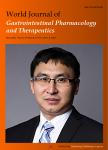Pathogenic mechanisms of pancreatitis
Pathogenic mechanisms of pancreatitis作者机构:Department of MedicineSection of Pulmonary DiseasesTulane Eosinophilic Disorders CenterTulane University School of MedicineNew OrleansLA 70112United States
出 版 物:《World Journal of Gastrointestinal Pharmacology and Therapeutics》 (世界胃肠药理与治疗学杂志(英文版)(电子版))
年 卷 期:2017年第8卷第1期
页 面:10-25页
学科分类:1002[医学-临床医学] 100201[医学-内科学(含:心血管病、血液病、呼吸系病、消化系病、内分泌与代谢病、肾病、风湿病、传染病)] 10[医学]
基 金:Supported by National Institutes of Health Nos.R01 DK067255 and R01 AI080581
主 题:Pancreatitis Pancreatic stellate cells Transforming growth factor-β/SMAD Janus kinase/signal transducers and activators Mitogen-activated protein kinases
摘 要:Pancreatitis is inflammation of pancreas and caused by a number of factors including pancreatic duct obstruction, alcoholism, and mutation in the cationic trypsinogen gene. Pancreatitis is represented as acute pancreatitis with acute inflammatory responses and; chronic pan-creatitis characterized by marked stroma formation with a high number of infiltrating granulocytes(such as neutrophils, eosinophils), monocytes, macrophages and pancreatic stellate cells(PSCs). These inflammatory cells are known to play a central role in initiating and promoting inflammation including pancreatic fibrosis, i.e., a major risk factor for pancreatic cancer. A number of inflammatory cytokines are known to involve in pro-moting pancreatic pathogenesis that lead pancreatic fibrosis. Pancreatic fibrosis is a dynamic phenomenon that requires an intricate network of several autocrine and paracrine signaling pathways. In this review, we have provided the details of various cytokines and molecular mechanistic pathways(i.e., Transforming growth factor-β/SMAD, mitogen--activated protein kinases, Rho kinase, Janus kinase/signal transducers and activators, and phosphatidylinositol 3 kinase) that have a critical role in the activation of PSCs to promote chronic pancreatitis and trigger the phenomenon of pancreatic fibrogenesis. In this review of literature, we discuss the involvement of several pro-inflammatory and anti-inflammatory cytokines, such as in interleukin(IL)-1, IL-1β, IL-6, IL--8 IL-10, IL-18, IL--33 and tumor necrosis factor-α, in the pathogenesis of disease. Our review also highlights the significance of several experimental animal models that have an important role in dissecting the mechanistic pathways operating in the development of chronic pancreatitis, including pancreatic fibrosis. Additionally, we provided several intermediary molecules that are involved in major signaling pathways that might provide target molecules for future therapeutic treatment strategies for pancreatic p



